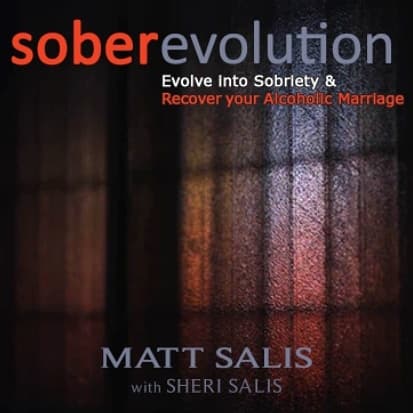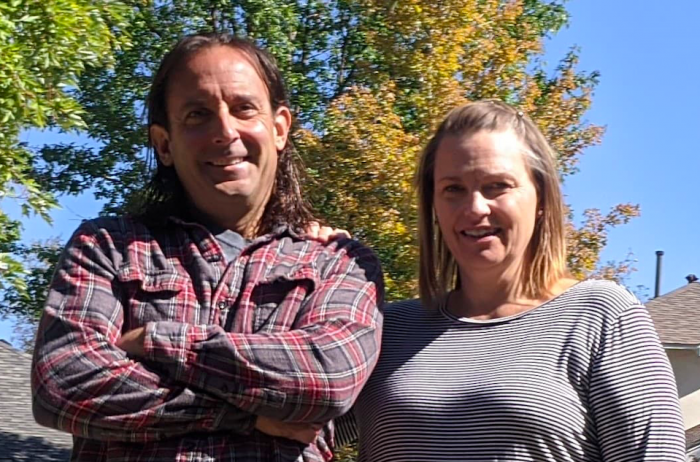Excerpt from Matt’s new book release, soberevolution: Evolve into Sobriety and Recover Your Alcoholic Marriage. Purchase your copy here.
~
This is a love story.
It is the story of the love that developed between me and my wife, and also my love for alcohol. It is the story of how a loving relationship and alcoholism can’t coexist. They just can’t. One will destroy the other every single time.
Sobriety doesn’t fix anything, but it is a prerequisite.
~
January 10, 2018 was the best day of my life.
That’s not my wedding day or the date of the births of any of my children. It’s not my sobriety date, either. That’s the day I sent over 3,000 emails to everyone who had ever given me their contact information, explaining that I was a high-functioning alcoholic, and that I had been sober for one year.
January 9th was the most terrifying day of my life. I was convinced I would be fired from my job, and I anticipated all the negative feedback I would receive when I admitted my affliction. It took every bit of courage I could muster to push the send button on the morning of the tenth. My decision to be open about my disease was rewarded in ways I never imagined possible.
First of all, I was not fired from my job. In fact, I later learned my boss was relieved to receive an email about a problem that I had already solved. It contrasted well with the rest of his inbox full of fires that required his attention. It was such a non-issue at work that a year later, my boss did not even remember the email I had been so terrified to send.
As for friends and family, the response and support I received was completely overwhelming. While everyone outside of my immediate and closest family was shocked (we high-functioning alcoholics exert incredible effort to hide our predilection), the warmth and encouragement I felt from my unsuspecting loved ones was tremendous. Some of my drinking buddies were among the most authentically excited that I had taken such a healthy step. I’m sure there are event invitations that no longer come my way, and I know my openness causes discomfort for some in my circle who internally question their own relationship with alcohol, but none of that is my problem. I have never heard a negative word about my admission.
The really magical part of my decision to shout about my sobriety is how it has transformed casual, throw-away relationships with acquaintances, neighbors and distant friends into bonds of shared pain and redemption. I’m not just talking about other alcoholics. So many people who I barely knew before heard the authenticity of my message and wanted to get to know me better. People are drawn to vulnerability. Honesty is attractive in ways that a blemish-free reputation never can be. To say that coming out about my alcoholism and recovery was life-changing is an enormous understatement.
The most transformational aspect of my decision to recover out loud is how it solidified the decision itself. I told everyone I knew that alcohol was killing me and destroying my family. Who was going to drink with me after that? Once I sent those emails, there was no going back. Sobriety was my sealed destiny. From that day forward, temptation and craving was powerless over me. I couldn’t drink if I wanted to. No amount of deceit and denial I had wielded so successfully as an active alcoholic would be enough to hide my drinking once I had pointed a spotlight in my own face. It was over. My drinking days were done.
As miraculous as my permanent sobriety was, my work was just beginning. In early recovery, as I expected my sobriety to improve my marriage, I was shocked to find that my relationship with my wife was getting worse.
A marriage has the potential to be the closest and most impactful relationship of our lives. It should not have surprised me that the damage done to my marriage by my active alcoholism was so profound and crippling. It should not have surprised me, but it did. My wife was skeptical about my sobriety as I had tried and failed to quit drinking so many times before. She felt like her pain was being ignored as my focus was singular and intense on finding relief from cravings and temptation to drink. Sheri wanted to support me, but there was no way she was lowering her guard and showing any vulnerability or weakness. The wall of resentment we had built between us in reaction to my alcoholism was tall and strong, and my enthusiastic commitment was not going to bring it down any time soon.
Alcoholism is a diabolical disease. Many marriages adapt to the trauma and disappointment that addiction delivers to the relationship. Protecting the intimate truth of being married to an alcoholic becomes part of the family legacy of lies and denials. Many couples avoid divorce when struggling to survive high-functioning alcoholism because of the shame of failure and the exposure of the root cause that would result from marital separation. They stay married. They stay intoxicated and emotionally abused. They adapt to a loveless relationship because the alternative is cloaked in stigma.
A 2014 study conducted at the University of Michigan found a 50% divorce rate for alcoholic marriages, 20% higher than marriages where alcohol abuse was not a problem. There is no surprise that addiction to alcohol caused an increase in failed marriages, but I think they studied the wrong thing. I have never found statistics on the percentage of marriages that fail after alcohol has been removed from the marriage. That was not a subset of the University of Michigan study. As far as I can tell, it has never been researched. That’s really too bad. The results from the Michigan study suggest, as has often been suggested in the addiction research community, that if you take away alcohol, things get better. That’s simply not the case.
Since it has never been studied, my assertion relies on personal experience and the stories of so many others in the recovery community. I would be willing to wager that if active alcoholism results in a 20% increase in divorce rate, sobriety in a formerly alcoholic marriage probably has twice the impact. It wouldn’t surprise me if alcoholic marriages dissolve at a 90% rate when the alcohol is removed for one or both of the spouses.
Recovering an alcoholic marriage is hard. Really hard. I don’t think it has ever been studied because the truth would be so damning. If failure is imminent, why try? I think the message a study like that would send to far too many drinkers is that you might as well keep on drinking. Keep suffering and battling and living a loveless, despair-filled life. The truth might leave couples feeling doomed and hopeless.
But there is hope.
Sheri and I made it, and our marriage has reached a level of cooperation, understanding, trust, love and intimacy we never imagined. It’s not like it was back in college when alcohol fueled our passion. It is much better. Surviving trauma permanently changes people. And when two people survive together, the resulting bond is unbreakable.
We read a lot of books and articles written by psychologists, addiction counselors and relationship therapists when we were trying to save our marriage in early sobriety from my alcoholism. The suggestions we found made sense, but they were too generic and unspecific, and ultimately, the advice was ineffective for us in our efforts to improve our relationship. This book isn’t about psychobabble and general recommendations for relationship improvement. If you are looking for a book based on scientific study or years of experience in a counseling practice, this book is not for you.
If you are looking for a man-bashing, divorce-promoting book to tell you your alcoholic spouse is evil and incapable of repentance, this is not the book for you. If you want tips on sober dating or sober casual sex in an alcohol-filled world, this book is not for you. If you want confirmation that your life and your relationship is hopeless, and you are looking for permission to give up trying, this book is not for you.
If you have already made up your mind—if the flame is not just burning out, but it has been permanently extinguished by too many lies, too much abuse and too much time wasted in a wasted marriage—then I’m sorry, but there is nothing we can do for you. This book is not for you.
But if you have even a glimmer of hope, please keep reading.
If you want to quit drinking alcohol, but nothing you have tried has worked, this book is for you regardless of relationship status. Before we tackle the topic of saving a marriage, we have to save ourselves. If you are a high-functioning alcoholic, single or married, man or woman, and you want to find freedom, I’m hopeful that my method of navigating early sobriety might resonate with you. I hope you keep reading.
If you are married to a high-functioning alcoholic, actively drinking or in sobriety, this book is for you. If you want your marriage to thrive, your partner will have to find sobriety. It is not a spiritual condition, nor is alcoholism a sign of weakness or immorality. It is a disease like cancer. If you are going to help your spouse find health, you need to understand the affliction. We will cover everything from brain chemistry and the patterns of the subconscious mind, to strategies for recovery and the benefits of recovering out loud. We can’t fix something we don’t understand, so we have to learn about alcoholism before we can defeat it. Like I said, sobriety is not a solution, but it is a prerequisite. If you are ready to learn about and beat alcoholism, this book is for you.
If you’ve successfully removed alcohol from your marriage, and your relationship is getting worse, this book is for you. After we understand how to find permanent sobriety, we have to figure out how to pick up the pieces of our life and rebuild. The marriage recovery cycle starts at resentment and ends at love and intimacy, but the journey is long and treacherous. If you want to know how we made it—how we found the courage, patience, trust, love and understanding to bridge the enormous divide my 25 years of heavy drinking created in our life together, we hope you’ll keep reading.
This book is our story, a love story. It is raw and descriptive and emotional and painful. It is about standing at the fork in the road and choosing the more difficult path, over and over again. It is about finding lasting sobriety when it would have been easier, albeit deadly, to just keep drinking. It is about digging deep and working through the massive barriers to love when we both probably deserved a fresh start without years of built-up resentments. It is about choosing the health of our children over the relief of leaving the pain and trauma behind. It is about willingness to try again—and again, and again, and again—until we figured it out, and the wounds began to heal.
This is our love story. If you still have hope, this could be your love story, too.
~
Excerpt from Matt’s new book release, soberevolution: Evolve into Sobriety and Recover Your Alcoholic Marriage. Purchase your copy here.
~












Read 4 comments and reply